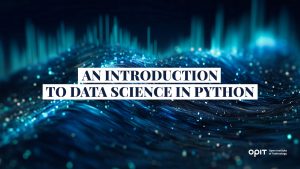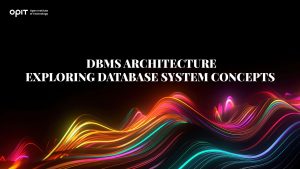

Data management is one of the biggest challenges for modern businesses. The more information that enters a company, the harder it is to stay on top of all of it. However, successful owners wouldn’t be where they are if they threw in the towel. They go out of their way to find a solution to solve this problem.
Enter database management systems (DBMSs). A database management system is a program that allows you to store and organize information more easily.
The importance of a DBMS can’t be overstressed. It can be a light at the end of the tunnel for many organizations. For example, it helps optimize performance across the board, increase productivity, and reduce cybersecurity risks.
This article will take a closer look at database management systems. We’ll explore the concept of database management systems, the basic principles of database management systems, and other essential aspects.
Types of Database Management Systems
We’ve defined a “database management system.” Next, it only seems natural to kick this introduction to database systems off with an examination of the types of software that address this issue.
Hierarchical DBMS
Much of today’s world is about hierarchies. There are hierarchies in your family, in the sequence of actions when starting a car, and in many other aspects of life.
Hierarchy also permeates data in the form of hierarchical database management systems. These solutions typically use tree-like formats to organize data from top to bottom or from bottom to top. Each approach is characterized by “parent and children” information.
Regardless of the approach, one thing’s for sure – children can’t have multiple parents, but parents can have multiple children. The same rings true for data points, meaning they can’t have three or four “parents.”
Network DBMS
A network database management system is similar to the hierarchical type. However, the two aren’t carbon copies of each other. The biggest difference is that “child” data can have more “parents” in a network DBMS. It allows IT professionals to accommodate complex information clusters.
Relational DBMS
The DBMS market is expected to soar to over $150 billion by 2030. You might think that such a valuable industry is only home to advanced solutions, but that’s not quite true.
Relational database management systems have a relatively simple premise – organizing data in columns and rows. In this respect, they work like Microsoft Excel and some other basic programs.
Object-Oriented DBMS
Object-oriented models use, well, models. They store all sorts of user information in structures known as classes.
NoSQL DBMS
Google and other internet giants process billions of terabytes of data daily. They need a robust database management solution that lets them stay on top of such vast quantities.
Salvation comes in the form of NoSQL. This system is incredibly scalable and flexible because it doesn’t require data set combinations. Therefore, it’s perfect for large-scale, big-data operations.
NewSQL DBMS
Finding a perfect database management system sometimes feel like looking for a needle in a haystack. However, it becomes an easier task if you have clear priorities. If you want a platform that combines the scalability of NoSQL and ACID compliance, check out NewSQL. It offers unrivaled data integrity, which also increases security.
Components of a Database Management System
Our introduction to database management systems has covered the DBMS definition, which answers the question “What is DBMS?” We’ve also explored various types of database management systems. Now let’s delve into the components of these solutions.
Database Engine
The engine of a database is like the foundation of a house. This core element processes every information and query that enters the system.
Data Definition Language (DDL)
You can’t have a house without a foundation, and you can’t build one without a roof either. That’s how important a DDL is to a database. It ensures pieces of information can interact with each other and facilitates data retrieval. It also allows you to modify certain parts of the structure.
Data Manipulation Language (DML)
The four basic operations of a database system are create, read, update, and delete. The DML is responsible for executing these tasks.
Data Control Language (DCL)
You’ve constructed the foundation of your house, but you need to keep intruders from entering with a door. A database also needs a door, and a DCL is the best solution. It determines who can access your system.
Transaction Management
Internal transactions are common in all databases. A transaction management system controls them to ensure ACID compliance.
Database Recovery
Database failure is like a devastating house fire that destroys everything – you don’t give up and do nothing. Instead, you rebuild the structure.
Database recovery works the same. It’s a set of tools that enables you to reconstruct your database from scratch.
Applications of Database Management Systems
A DBMS, especially a DBMS full form, has a wide range of applications. The technology is as versatile as a hybrid vehicle, meaning you can use it practically anywhere. Here’s where you can regularly find database management systems:
- Banking and finance – Financial institutions need a fully functional DBMS to process loan, account, and deposit information.
- Healthcare – Hospitals and other healthcare organizations have numerous patient records. Managing them is much easier with a DBMS.
- Telecommunications – Have you ever thought about how your cell phone carrier maintains your information and that of millions of others? The answer lies in a DBMS. It stores phone records and bills, among other crucial information.
- Education – If you’re a student, your school or college needs to keep track of your attendance, marks, and assignments. The best way to do so is to set up a database management system.
- E-commerce – How do various e-commerce platforms streamline your shopping experience? They implement a DBMS to recommend products and services, record your habits, and memorize your payment information.
- Government and public sector – The applications of database management systems for government are virtually endless. These include national security, voter registration, and social security.
Principles of Database Management Systems
Although there are numerous database management systems, they take the same approach to storing and organizing information. Each platform needs to follow these principles:
- Data independence – This principle is pretty self-explanatory. If you can change a piece of information in your database, your structure is independent.
- Data consistency – You might store the same folder in different locations on your computer for backup purposes. You should be able to do the same with data in your database without altering the information. If the data appears differently in various locations, it’s inconsistent.
- Data integrity – The last thing you want is to work with corrupt information. It can affect the rest of the database and grant unauthorized personnel access to your data. But none of this is an issue if your system has high data integrity.
- Data security – Data security is like home security – you don’t want invaders to steal your possessions. On the same note, you don’t want cyber criminals to tap into the system and compromise sensitive information.
- Data recovery – If your system shuts down unexpectedly, you need to be able to retrieve your information in its last saved state.
- Concurrency control – A database management system isn’t designed to perform just one operation. It can run numerous tasks simultaneously, which is why you need concurrency control to manage the execution of those operations.
Examples of Popular Database Management Systems
Here are some of the most common database management systems:
- Oracle database – A relational system that comes in two versions: cloud and on-premises.
- Microsoft SQL server – Another relational program, which is built on the SQL architecture.
- MySQL – Companies with large databases use MySQL to organize and control massive amounts of information.
- PostgreSQL – This is an object-relational database that complies with the SQL environment.
- MongoDB – A scalable and flexible system with optimized indexing and queries.
- IBM Db2 – If you’re looking for a platform developed by a tech giant, IBM Db2 is a great choice. It’s perfect for real-time information analysis.
Notes and Basics of Database Management Systems
To wrap up the discussion about database systems, we’ll cover the basics of database management systems and database management system notes:
- Importance of data modeling – Just as you tidy up your room to find clothes more easily, you want to model data to retrieve information effortlessly. The process eliminates redundant details for easier management.
- Database normalization – Another great way to reduce errors in a DBMS is to perform database normalization. It allows for accurate modifications and helps improve your workflow.
- Indexing and query optimization – By indexing the data in your system, you decrease the information your queries need to analyze. In turn, this leads to higher database efficiency.
- Backup and recovery strategies – IT professionals must have sound backup and recovery strategies in place. They reduce downtime associated with information loss after shutdowns or errors.
- Database administration and maintenance – A database administrator should formulate the overall strategy for the entire system. It simplifies maintenance and lowers the risk of errors.
The Concept of DBMS Demystified
Much of cutting-edge technology is an enigma, but hopefully, that’s no longer the case with database management systems. Hierarchical, network, relational, and other systems are instrumental in organizing information and making it more accessible. The onus is on IT professionals to master each solution applicable to their industry to improve their company’s workflows.
Future trends may put extra emphasis on this need. As most databases migrate to the cloud and organizations prioritize cyber security, IT experts will need to adapt their approach to database management.
Have questions?
Visit our FAQ page or get in touch with us!
Write us at +39 335 576 0263
Get in touch at hello@opit.com
Talk to one of our Study Advisors
We are international
We can speak in:




